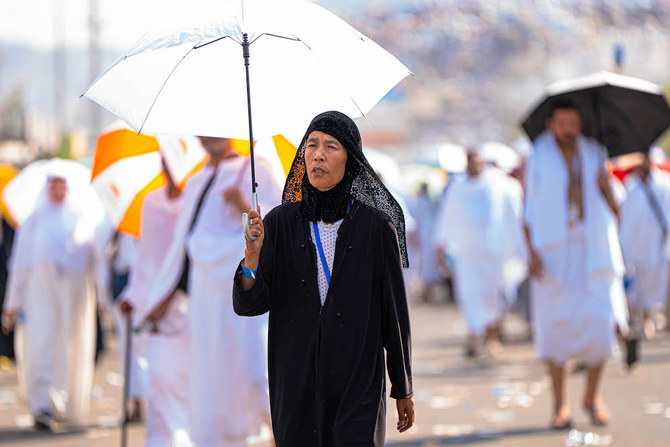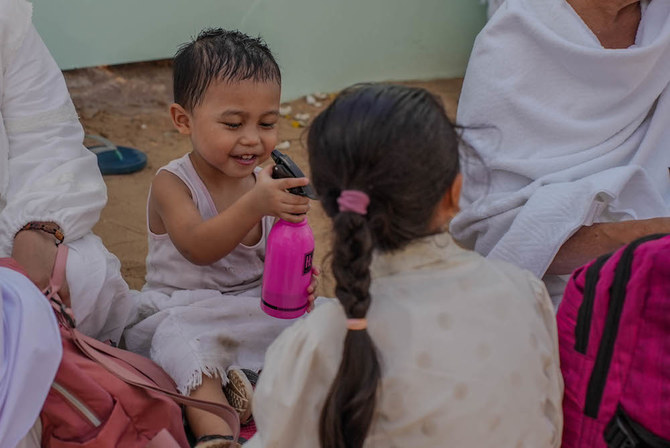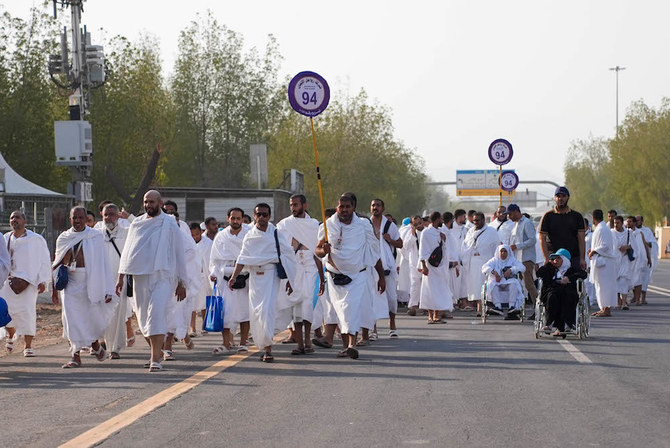ARAFAT: Amid strict security and health measures, this year’s Hajj pilgrims arrived in Arafat early Saturday morning, the ninth day of Dul Hijjah, and attended the annual Hajj sermon at Namirah Mosque.
As the sun rose, pilgrims camping in the tent city of Mina performed dawn prayers, then began their journey to Arafat, where Prophet Muhammad gave his final sermon more than 144 decades ago. On Saturday, one could hear nothing louder than the crowd chanting supplications.
Ansarul-Haq Rasheed, a 63-year-old Indonesian pilgrim, expressed a heartfelt desire to pray to Allah for as long as possible.
“I wish time could pause so I could continue praying to Allah with all my heart,” he told Arab News. “These moments are unforgettable. I want to lay bare all my emotions to my creator, who knows everything. I seek His blessings for my needs in this life and the hereafter.”
Reflecting on the pilgrimage experience, he expressed gratitude for the services provided to pilgrims. He compared it with stories he had been told of his late father’s Hajj, some 45 years ago. “My mother shared the hardships my father faced during Hajj; I wish he could see how much more comfortable Hajj has become,” Rasheed said.
Meanwhile, 49-year-old Khadija Yakoubi, a Moroccan pilgrim, anticipated a transformative experience from his pilgrimage.
“When all sins are forgiven, life inevitably changes for the better, leading to a renewed enjoyment. This feeling motivates pilgrims to continue doing good throughout their lives,” Yakoubi said, adding that the services pilgrims have received at the holy sites have been “exemplary.”
The Day of Arafat is the most important part of the Hajj — one of Islam’s five pillars; without it, a pilgrimage is not valid. Pilgrims typically combine and shorten the Dhuhr and Asr prayers before staying in Arafat until sunset. They then move on to Muzdalifah before returning to their tents in Mina.
Sheikh Maher bin Hamad Al-Muaiqly, one of the imams of the Grand Mosque, who delivered this year’s sermon, described Hajj as a “sincere act of worship for Allah.”
He urged pilgrims to seize “the great blessings” during their time in Arafat, reminding them that “in this honorable place and virtuous time, the Almighty multiplies his rewards” for their good deeds and forgives their sins.
In his sermon, Al-Muaiqly emphasized that Islam is a religion of peace and that Shariah “mandates justice, noble ethics, and kindness to parents, along with the importance of maintaining family ties, truthfulness in speech, and safeguarding rights to ensure they are rightfully upheld. It also emphasizes respect for contracts and encourages obedience to rightful authorities.”
He added that Shariah also emphasizes the obligation to obey the five central religious laws: safeguarding religion, and protecting the soul, the mind, one’s possessions, and one’s dignity — all important principles in Islamic jurisprudence and ethics, and, he said, guiding principles for the well-being and growth of individuals and society.
“Indeed, Shariah considers any transgression against these basics a crime deserving punishment. Furthermore, safeguarding these essentials is a path to entering paradise and attaining Allah’s satisfaction. It also serves as a key to stability, happiness, progress, and advancement in this world,” the imam said.































